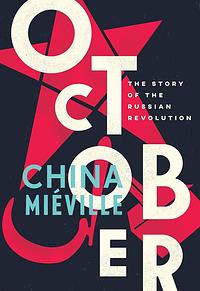Take a photo of a barcode or cover
challenging
informative
tense
medium-paced
About 30% of this book is fantastic: tense, gripping prose evoking the frantic atmosphere of revolutionary Russia, Miéville’s craft on full display as the book rushes breathlessly through freezing pre-dawn streets to cramped meetings roaring with radical power.
The other 70% is long lists of people, places, and committees, with no effort made to explain the difference between, say, a Menshevik and a Left SR, or what the hell a Soviet actually is. Miéville’s research and passion are undeniable, but writing accessible history is not the same thing as writing fiction - and however good he is at the latter, he needs some practice at the former.
The other 70% is long lists of people, places, and committees, with no effort made to explain the difference between, say, a Menshevik and a Left SR, or what the hell a Soviet actually is. Miéville’s research and passion are undeniable, but writing accessible history is not the same thing as writing fiction - and however good he is at the latter, he needs some practice at the former.
Moderate: Suicide
Minor: Gun violence, Rape
This was kind of a nightmare to get through. Besides my general lack of knowledge on the topic/names of the dozens of key players, this was just horribly written. The first thing that jumped out at me was the immense vocabulary used by Miéville. I am pretty well read and there were just so many words I have NEVER seen before or have maybe seen once in an academic paper. I mostly used context clues to figure these out but there was so many to the point that it was disruptive. I don't know how this is meant to be a beginner friendly text (which it claims in the intro) with the sheer amount of extraneous vocabulary that the average person has no chance of knowing. Second, the sentence structure is just horrible. This is obviously a joke, but it felt like there wasn't a single sentence without at least 3 commas. THERE WERE SO MANY COMMAS. Miéville could not get through a single sentence without interrupting the flow to point out something minute that could have been added at the end. I imagine the audiobook would be very confusing to follow. His transitional sentences also were worded in the most confusing way possible. I often found myself pausing, saying "what?" out loud, and eventually figuring out what he meant after a second or two. Definitely not a good reading experience.
I also feel like he never explained things? He would just throw out a concept in one sentence and completely move on without explaining what it meant or why it was important. For example, I have no idea what right-wing or left-wing mean in the context of Russia in 1917, or what the Bolshevik party stands for (or any of the other parties for that matter). He would say something like "they voted to pass x measure" but not say what the measure entailed or what it would effect. Maybe that wasn't the point of the book as Miéville imagined it, but the information still felt incomplete. All in all I have a vague idea of the timeline but no concrete knowledge about the politics.
I also feel like he never explained things? He would just throw out a concept in one sentence and completely move on without explaining what it meant or why it was important. For example, I have no idea what right-wing or left-wing mean in the context of Russia in 1917, or what the Bolshevik party stands for (or any of the other parties for that matter). He would say something like "they voted to pass x measure" but not say what the measure entailed or what it would effect. Maybe that wasn't the point of the book as Miéville imagined it, but the information still felt incomplete. All in all I have a vague idea of the timeline but no concrete knowledge about the politics.
challenging
emotional
hopeful
informative
reflective
tense
medium-paced
An absolute standout work of historical writing. Miéville has the most remarkable ability to communicate both the minutiae and the milestones of history with the same thrilling enthusiasm.
The introduction to the book is a perfect example. It sweeps through the entire history of St Petersburg, and with it all of Russia. Miéville covers hundreds of years all without losing sight of small details. Characters and political factions who will remain relevant all the way to the glossary are introduced and developed with a eye to both their personal characters and motivations, and the role they'll play in the grand narrative of history. Amusing anecdotes, small milestones, digressions into historical minutiae all build together into the beginnings of a narrative that, by the time the first chapter arrives, already feels primed to explode in a dozen different directions at once. There are so many moving parts, characters and groups and political ideologies, all jostling to be heard above the din of history and Miéville does an excellent job of giving them all their moment.
The sheer number of things going on, and characters involved can sometimes make for a very dense narrative. I recommend making frequent use of the glossary of important characters and, where that doesn't suffice, using the index or outside sources to frequently remind yourself of who all the important parties are. However, the breathless emotional undercurrent which drives the book makes it infectiously readable. It is very easy to feel engrossed in even seemingly banal details of bureaucratic hair-splitting, letter-writing, and endless committees and proclamations.
This is a (very well narrated) story of one of the most interesting moments in political history, and any writer would be hard-pressed to explore it with the nuance and infectious vitality that Miéville brings to its events. October is a must-read for anyone even vaguely interested not just in the October revolution, but in the chaotic and lively workings of history and politics in general.
The introduction to the book is a perfect example. It sweeps through the entire history of St Petersburg, and with it all of Russia. Miéville covers hundreds of years all without losing sight of small details. Characters and political factions who will remain relevant all the way to the glossary are introduced and developed with a eye to both their personal characters and motivations, and the role they'll play in the grand narrative of history. Amusing anecdotes, small milestones, digressions into historical minutiae all build together into the beginnings of a narrative that, by the time the first chapter arrives, already feels primed to explode in a dozen different directions at once. There are so many moving parts, characters and groups and political ideologies, all jostling to be heard above the din of history and Miéville does an excellent job of giving them all their moment.
The sheer number of things going on, and characters involved can sometimes make for a very dense narrative. I recommend making frequent use of the glossary of important characters and, where that doesn't suffice, using the index or outside sources to frequently remind yourself of who all the important parties are. However, the breathless emotional undercurrent which drives the book makes it infectiously readable. It is very easy to feel engrossed in even seemingly banal details of bureaucratic hair-splitting, letter-writing, and endless committees and proclamations.
This is a (very well narrated) story of one of the most interesting moments in political history, and any writer would be hard-pressed to explore it with the nuance and infectious vitality that Miéville brings to its events. October is a must-read for anyone even vaguely interested not just in the October revolution, but in the chaotic and lively workings of history and politics in general.
Minor: Genocide, Suicide, Violence, Antisemitism, Religious bigotry, Murder, War, Classism
It feels wrong to tag this with "classism" but I guess it's accurate?
It's a revolution that took place in the midst of war and famine. There are no gory details, but plenty of the expected violence, suffering, and death is mentioned.
challenging
informative
reflective
medium-paced
An exceptional read about the failed 1905 Russian Revolution and the 1917 Russian Revolution. I genuinely cannot recommend this book enough if you want the history written in a captivating way. All I can say is that this book, upon flipping back to the beginning and seeing the two rows of dots led me to tears.
Minor: Violence, Xenophobia, Antisemitism
informative
medium-paced
Great overview from start to finish of the Russian Revolution. Almost no dull spots, written almost like a fantasy epic. Great book!
3.5/5
Ένα ιστορικό βιβλίο που διαβάζεται ως μυθιστόρημα είναι πάντα ευχάριστο ιδίως όταν πρόκειται για το χρονικό γεγονότων που έμελλαν να αλλάξουν την ιστορία και στη συνέχεια να "χαθούν" κατά κάποιο τρόπο από τα όσα ακολούθησαν.
Ο συγγραφέας από την αρχή του βιβλίου υποστηρίζει πως έχει μια αριστερή θεώρηση των πραγμάτων αλλά προσπαθεί να είναι δίκαιος. Τελειώνοντας το βιβλίο μπορώ να πω ότι το πετυχαίνει και με το παραπάνω. Δεν χαρίζεται σε κανέναν, επαναστάτη, αντεπαναστάτη ή "επαναστάτη" και όσα γράφει στον επίλογο είναι σκληρά και χωρίς παρωπίδες.
Το βιβλίο αυτό καθεαυτό καλύπτει τα γεγονότα του 1917 που οδήγησαν στον Οκτώβρη, στην ουσία το διάστημα από το Φεβρουάριο μέχρι και την 25η Οκτωβρίου. Αν και αναφέρονται γεγονότα από όλη τη χώρα, στην ουσία το βιβλίο επικεντρώνεται στο τότε Πέτρογκραντ, την πρωτεύουσα όπου χτυπούσε η καρδιά των γεγονότων.
Ίσως όσοι περιμένουν ένα πλήρες χρονικό της επαναστατικής Ρωσίας απογοητευτούν αλλά ο συγγραφέας προτείνει αρκετά βιβλία για όσους ενδιαφέρονται για παραπάνω. Προσωπικά αυτή η οπτική μου άρεσε, εστιάζει τη ματιά του αναγνώστη και δημιουργεί συνέχεια και ρυθμό. Ο συγγραφέας δεν αναλώνεται σε μακροσκελείς ιδεολογικές αναλύσεις, ούτε πέφτει στην παγίδα της υπερβολικής χρήσης κειμένων της εποχής κάνοντας το βιβλίο ιδιαίτερα προσιτό.
Εν κατακλείδι το θεωρώ ένα πολύ καλό βιβλίο στο οποίο διαβάζει κανείς τα πραγματικά γεγονότα της εποχής απογυμνωμένα από τη μετέπειτα μυθοποίηση ή δαιμονοποίησή τους.
A book about historical facts that have been mis-interprereted quite often and manages to be easy to read and accurate.
The book focuses on Petrograd, then capital of Russia and the events that took place from February to October 1917. It is not a full history of everything that happened everywhere and more importantly it doesn't examine the period after the 25th of October.
The author manages in my opinion to be honest and presents the people involved as accureately as possible. The book is free of boring political analysis but it conveys the main arguments clearly.
An interesting read for anyone who would like to have a clear idea of what happened then.
Ένα ιστορικό βιβλίο που διαβάζεται ως μυθιστόρημα είναι πάντα ευχάριστο ιδίως όταν πρόκειται για το χρονικό γεγονότων που έμελλαν να αλλάξουν την ιστορία και στη συνέχεια να "χαθούν" κατά κάποιο τρόπο από τα όσα ακολούθησαν.
Ο συγγραφέας από την αρχή του βιβλίου υποστηρίζει πως έχει μια αριστερή θεώρηση των πραγμάτων αλλά προσπαθεί να είναι δίκαιος. Τελειώνοντας το βιβλίο μπορώ να πω ότι το πετυχαίνει και με το παραπάνω. Δεν χαρίζεται σε κανέναν, επαναστάτη, αντεπαναστάτη ή "επαναστάτη" και όσα γράφει στον επίλογο είναι σκληρά και χωρίς παρωπίδες.
Το βιβλίο αυτό καθεαυτό καλύπτει τα γεγονότα του 1917 που οδήγησαν στον Οκτώβρη, στην ουσία το διάστημα από το Φεβρουάριο μέχρι και την 25η Οκτωβρίου. Αν και αναφέρονται γεγονότα από όλη τη χώρα, στην ουσία το βιβλίο επικεντρώνεται στο τότε Πέτρογκραντ, την πρωτεύουσα όπου χτυπούσε η καρδιά των γεγονότων.
Ίσως όσοι περιμένουν ένα πλήρες χρονικό της επαναστατικής Ρωσίας απογοητευτούν αλλά ο συγγραφέας προτείνει αρκετά βιβλία για όσους ενδιαφέρονται για παραπάνω. Προσωπικά αυτή η οπτική μου άρεσε, εστιάζει τη ματιά του αναγνώστη και δημιουργεί συνέχεια και ρυθμό. Ο συγγραφέας δεν αναλώνεται σε μακροσκελείς ιδεολογικές αναλύσεις, ούτε πέφτει στην παγίδα της υπερβολικής χρήσης κειμένων της εποχής κάνοντας το βιβλίο ιδιαίτερα προσιτό.
Εν κατακλείδι το θεωρώ ένα πολύ καλό βιβλίο στο οποίο διαβάζει κανείς τα πραγματικά γεγονότα της εποχής απογυμνωμένα από τη μετέπειτα μυθοποίηση ή δαιμονοποίησή τους.
A book about historical facts that have been mis-interprereted quite often and manages to be easy to read and accurate.
The book focuses on Petrograd, then capital of Russia and the events that took place from February to October 1917. It is not a full history of everything that happened everywhere and more importantly it doesn't examine the period after the 25th of October.
The author manages in my opinion to be honest and presents the people involved as accureately as possible. The book is free of boring political analysis but it conveys the main arguments clearly.
An interesting read for anyone who would like to have a clear idea of what happened then.
challenging
medium-paced
I do not have the intellectual bandwidth to comprehend this book anymore. Its just lists of people doing things.
Mieville's foray into popular history writing gives the reader a sense of the momentum and excitement generated by the Russian Revolution. Histories are rarely page-turners, but "October" is the rare exception. I also appreciated how, in contrast to other older popular histories of the Russian Revolution (looking at you Edmund Wilson), Mieville incorporate's perspectives from across the Russian empire and across age, gender, and class demographics.
"October" is a fast, exciting read, but it does have two serious flaws. While the book is written in an accessible style, it's portrayal of such a wide-ranging and diverse movement makes it difficult to follow at times. There are so many characters introduced that it is a challenge to keep track of them all. Paradoxically, though Mieville does bring in outside voices, "October" often feels insular. It was not always clear to me why the Russian Revolution was important. More context for how the Russian Revolution was perceived by those outside of Russia would have ameliorated this problem.
A worthwhile read overall and one I would highly recommend to those sympathetic to the political left, but unfamiliar with the Russian Revolution's history. For those looking for a sober synthesis of that history I would recommend Sheila Fitzpatrick's "The Russian Revolution" as an alternative.
"October" is a fast, exciting read, but it does have two serious flaws. While the book is written in an accessible style, it's portrayal of such a wide-ranging and diverse movement makes it difficult to follow at times. There are so many characters introduced that it is a challenge to keep track of them all. Paradoxically, though Mieville does bring in outside voices, "October" often feels insular. It was not always clear to me why the Russian Revolution was important. More context for how the Russian Revolution was perceived by those outside of Russia would have ameliorated this problem.
A worthwhile read overall and one I would highly recommend to those sympathetic to the political left, but unfamiliar with the Russian Revolution's history. For those looking for a sober synthesis of that history I would recommend Sheila Fitzpatrick's "The Russian Revolution" as an alternative.








